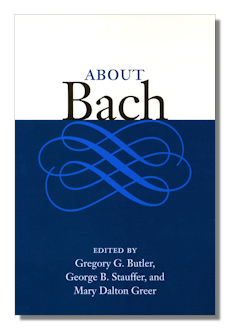
The Internet's Premier Classical Music Source
Related Links
-
Introduction
Acoustics
Ballet
Biographies
Chamber Music
Composers & Composition
Conducting
Criticism & Commentary
Discographies & CD Guides
Fiction
History
Humor
Illustrations & Photos
Instrumental
Lieder
Music Appreciation
Music Education
Music Industry
Music and the Mind
Opera
Orchestration
Reference Works
Scores
Thematic Indices
Theory & Analysis
Vocal Technique
Search Amazon
Recommended Links
Site News
 Book Review
Book Review
About Bach

Gregory Butler, George Stauffer and Mary Dalton Greer, editors
University of Illinois Press. 2008. xi + 216 pp.
ISBN-10: 0252033442
ISBN-13: 978-0252033445
There is probably more scholarship conducted now and in the recent past on Johann Sebastian Bach than on any other composer. There are certainly more books on the composer than on any other. This state of affairs can be argued to reflect Bach's status – as an analogous situation in literature can be argued for Shakespeare. Yet any new publication, even at as reasonable price as $30 (cloth), must justify itself by adding something, revealing new material and/or re-presenting familiar material in new ways or a new light. Ideally, too, new interpretative expertise should be included.
About Bach (University of Illinois Press) is a new collection of 15 essays, ranging in length from 8 to 22 pages, edited by specialists Gregory Butler, George Stauffer and Mary Dalton Greer, who each also contribute a chapter or essay. It meets all of those criteria and no serious Bach enthusiast, or indeed lover of "early" and Baroque music will want to overlook it. About Bach has the merit of being particularly well-focused. It's organized into five sections: the origins and context of Bach and his family; the vocal music; his colleagues; the instrumental music; and Bach's legacy. Although the subjects of some of the essays are quite specific (Carl Reinecke's performance of Mozart's Larghetto, for example), there is an internal logic to their selection and sequence. Although such topics are clearly specialisms of their writers, there's nothing self-indulgent about their appearance, or construction. Robert Hill's on Mozart, for example, is typical in using a particular composition to illustrate a more general issue of performance practice… in this case the development of accentuation from being quantitative to qualitative.
Then there is Stauffer's own essay on Bach's Collegium Musicum at Leipzig. Apparently very specific. Yet Stauffer shows that the repertoire supervised by Bach in the years 1729 to 1737 and 1739 to at least 1741 had the dual aspects of including both contemporary, progressive even, music; and much Italian and italianate music. This again adds to our appreciation of Bach as the colossus he was – if for no other reason (and of course this book advances many) than the breadth, depth and multiplicity of his achievements. Not that the book ever errs by offering spurious or gratuitous praise which might have needed to be supported but isn't. Indeed each essay is followed by copious notes and references – and sometimes a brief summary. It's also appropriately illustrated by extracts from and facsimiles of scores, tables, quotes and even bar charts.
The very real challenges for editors compiling such a potentially significant resource as this are several: consistency of style from over a dozen contributors from around the world, without imposing unnatural uniformity; ensuring that material is not unwittingly duplicated, yet not disallowing diverse points of view; and ensuring that the ground covered reflects an editorial thrust that will result in a sum which is greater than its individual parts. This has all been accomplished splendidly by Butler, Stauffer and Dalton Greer. To work your way through About Bach is to marvel at the level and range of scholarship on which we are lucky enough to be able to draw now. But it's also to be made newly aware of the immensity of Bach's achievement (and influence) thanks to the transparency – and humility – of that scholarship.
It is, in fact, an intention of the editors of About Bach that the composer's importance be revealed and celebrated. Many lovers of his music are rightly satisfied to listen to it on its own terms, without reference to sources, parallel developments and influences on Bach; are aware of his influence in turn on later composers; and may not want necessarily to explore the technicalities of its construction or origins. About Bach, though, gently suggests (although doesn't actually insist) that one's appreciation of Bach can be enhanced by familiarity with aspects of this wider set of concerns and circumstances. Ton Koopman's excellent essay on basso continuo realization, for example, makes the useful distinction between written-out obbligato and improvisation. Given what we know of the way Bach performed, yet another marvel (Bach's exceptional ability in this regard) is exposed.
Reflecting the varied subject matter, the 15 contributors use a variety of musicological techniques in About Bach including: close analysis of the score; assessment of the music in context; the wider historical perspective; biography and performance practicalities. This only adds to the accessibility of and pleasure to be gained from reading the book… it's lively, fresh, refreshingly accurate and thorough – not to mention thoroughly researched and produced. Not for nothing is About Bach dedicated to the world's greatest living Bach scholar, Christoph Wolff.
If you're looking for an example of current state-of-the-art Bach scholarship which will also guide you through some of the most significant issues in study of the composer, enjoy the open and at the same time scholarly styles of leading experts, performers and analysts, and wish to come away feeling well and truly connected with informed thinking about Bach's place in the wider musical pantheon, About Bach – especially at the extremely reasonable price – is a must. Thoroughly recommended.
Copyright © 2009 by Mark Sealey


















